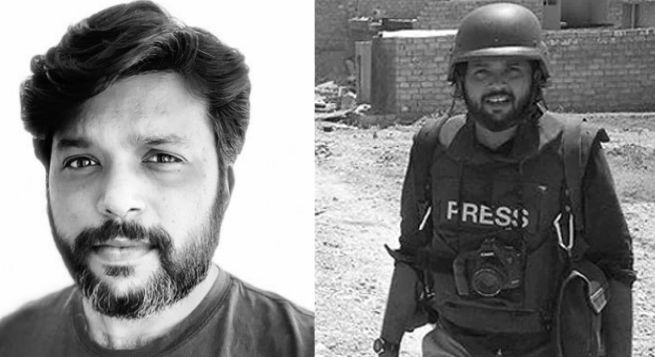Reuters journalist Danish Siddiqui was killed on Friday while covering a clash between Afghan security forces and Taliban fighters near a border crossing with Pakistan, an Afghan commander said.
Afghan special forces had been fighting to retake the main market area of Spin Boldak when Siddiqui and a senior Afghan officer were killed in what they described as Taliban crossfire, the official told Reuters, which sent this news dispatch with reports from Kabul, Islamabad and Mumbai.
Siddiqui had been embedded as a journalist since earlier this week with Afghan special forces based in the southern province of Kandahar and had been reporting on fighting between Afghan commandos and Taliban fighters.
“We are urgently seeking more information, working with authorities in the region,” Reuters President Michael Friedenberg and Editor-in-Chief Alessandra Galloni said in a statement.
In response to queries regarding Siddiqui in Afghanistan, an Indian government spokesperson, Arindam Bagchi, said: “Our Ambassador in Kabul is in touch with Afghan authorities. We are keeping his family informed of the developments.”
Danish Siddiqui covered war zones and crises from Iraq to Hong Kong to Nepal. He was killed on Friday covering Afghan-Taliban clashes near the Pakistan border.
Afghan President Ashraf Ghani said in a statement on Twitter that he was “deeply saddened with the shocking reports” of Siddiqui’s death and extended condolences to his family.
Several prominent Indian personalities , including Information and Broadcasting Minister Anurag Thakur, Punjab CM Amrinder Singh and Congress MP Shahsi Tharoor, apart from senior journalists, expressed their condolences and shock at the death.
Meanwhile, Siddiqui told Reuters he had been wounded in the arm by shrapnel earlier on Friday while reporting on the clash. He was treated and Taliban fighters later retreated from the fighting in Spin Boldak.
Siddiqui had been talking to shopkeepers when the Taliban attacked again, the Afghan commander said.
Taliban spokesman Zabihullah Mujahid said the Taliban had not been aware there was a journalist reporting from the site of what he described as a “fierce battle” and that it was not clear how Siddiqui had been killed.
Siddiqui was part of the Reuters photography team to win the 2018 Pulitzer Prize for Feature Photography for documenting the Rohingya refugee crisis, a series described by the judging committee as “shocking photographs that exposed the world to the violence Rohingya refugees faced in fleeing Myanmar”.
A Reuters photographer since 2010, Siddiqui’s work spanned the wars in Afghanistan and Iraq, the Rohingya refugee crisis, the Hong Kong protests and Nepal earthquakes. In recent months, his searing photographs capturing the coronavirus pandemic in India have been published across the world.
 Prime Video to limit in India number of TV sets having access per subscription
Prime Video to limit in India number of TV sets having access per subscription  Delhi HC orders meta to remove deepfake videos of Rajat Sharma
Delhi HC orders meta to remove deepfake videos of Rajat Sharma  Govt. blocked 18 OTT platforms for obscene content in 2024
Govt. blocked 18 OTT platforms for obscene content in 2024  Broadcasting industry resists inclusion under Telecom Act
Broadcasting industry resists inclusion under Telecom Act  DTH viewing going down & a hybrid ecosystem evolving: Dish TV CEO
DTH viewing going down & a hybrid ecosystem evolving: Dish TV CEO  Abhishek Singh Rajput shines in ‘Swipe Crime’ on MX Player
Abhishek Singh Rajput shines in ‘Swipe Crime’ on MX Player  Farhan Akhtar’s ‘120 Bahadur’ to hit theatres on November 21, 2025
Farhan Akhtar’s ‘120 Bahadur’ to hit theatres on November 21, 2025  COLORS announces 2025 lineup
COLORS announces 2025 lineup  Sony YAY! announces holiday wishes from Toon-Town this Christmas
Sony YAY! announces holiday wishes from Toon-Town this Christmas  8Bit Creatives partners with ESFI to elevate WAVES esports championship 2025
8Bit Creatives partners with ESFI to elevate WAVES esports championship 2025 








